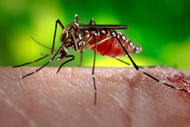Dengue virus:
Dengue virus (DENV) represents a serious threat to the global community with an estimated 25 to 100 million infections, 500,000 hospitalizations and ~25,000 DENV-associated deaths occurring each year. As with WNV and YFV, DENV is transmitted to humans through exposure to infected mosquitoes. This pathogen has spread worldwide, with the CDC estimating that one third of the world’s population is now at risk for infection. Within DENV, there are 4 distinct serotypes (DENV1, DENV2, DENV3, DENV4) and each serotype has been found to cause human disease and mortality. DENV infection may result in a spectrum of disease, ranging from acute, febrile illness (dengue fever; DF) to severe, life-threatening hemorrhagic disease (dengue hemorrhagic fever; DHF/dengue shock syndrome; DSS). Infection with one DENV serotype is believed to provide durable protective immunity against reinfection by that particular serotype. However, immunity to one DENV serotype may predispose an individual to more severe disease if infected by a second DENV serotype through a process believed to be associated with antibody-dependent enhancement (ADE) of infection. While the role of ADE in severe disease remains unclear, this concept nonetheless remains an important consideration in terms of vaccine development. As such, it is widely accepted that an optimal DENV vaccine must provide immunity against all 4 serotypes for broad protection and to prevent the potential complications of ADE.
Although there are several vaccine candidates in various stages of development, there is currently no licensed vaccine against DENV. Utilizing the strong collaborations formed for related vaccine projects, Najít recently entered into a consortium partnership with Oregon Health & Science University (OHSU) and Washington University-St. Louis (WUSL) to develop a tetravalent inactivated DENV vaccine. This partnership leverages Najít’s experience in preclinical manufacturing and testing of inactivated viral vaccines, with the strength of expertise in virology and immunology provided by OHSU and WUSL. Following optimization of virus growth and purification, inactivation will be achieved using Najít’s Hydrovax™ platform, with the goal of producing cGMP vaccine material suitable for Phase I clinical trials.


